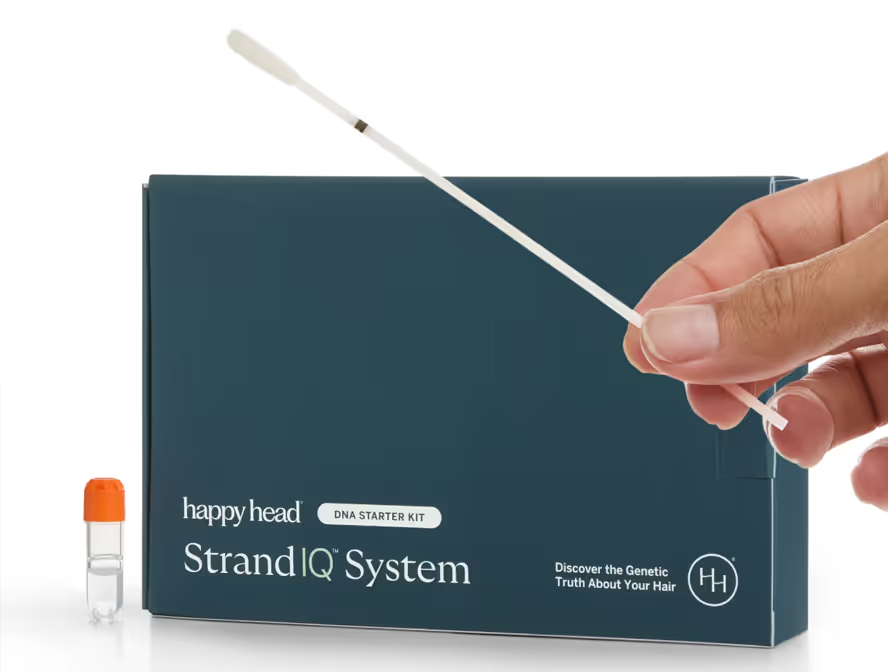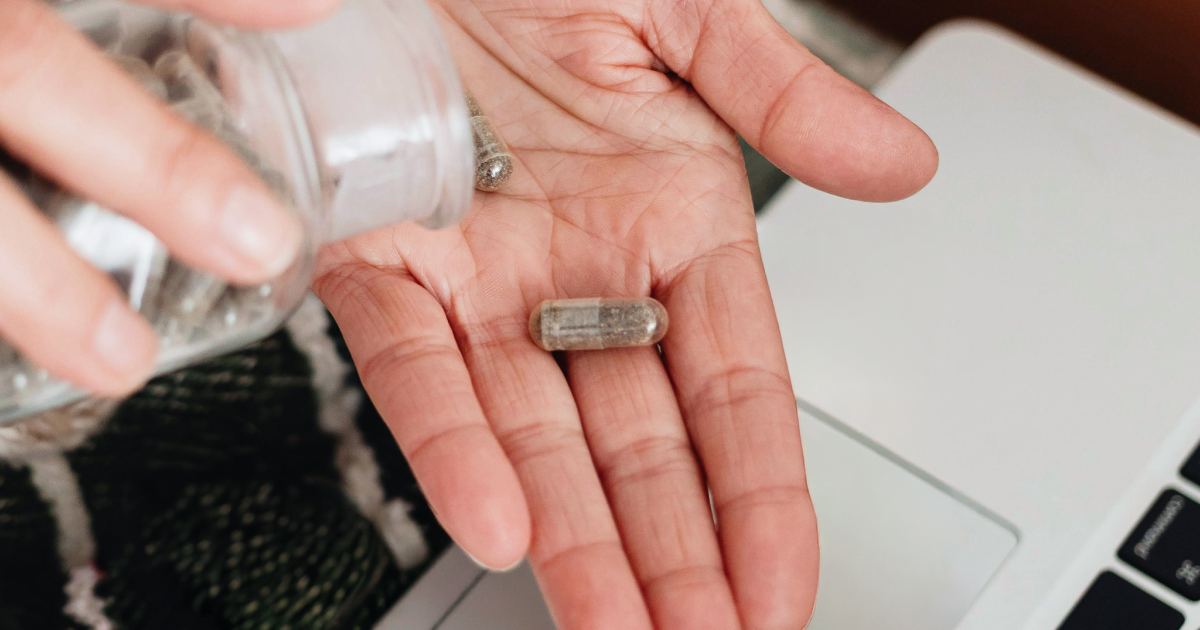Using tea tree oil for hair has become increasingly popular among those looking for natural ways to care for their scalp and strands. Known for its potent antimicrobial and anti-inflammatory properties, this essential oil has a long history of use in skin and scalp care.
However, while its benefits are widely promoted in the wellness world, it’s important to separate hype from evidence, especially when dealing with scalp conditions or hair thinning.
To help you determine if tea tree oil is right for you, we’ll explore what tea tree oil is, how it works, who it may help, and how to use it safely and effectively as part of your hair care routine.
What Is Tea Tree Oil?
Tea tree oil is an essential oil extracted from the leaves of the Melaleuca alternifolia tree, native to Australia.
This potent oil has been used for centuries in traditional medicine for its antimicrobial, antiseptic, antifungal, antiviral, and anti-inflammatory properties. Its active compounds, most notably terpinen-4-ol, are responsible for its ability to combat bacteria, fungi, and viruses.
Tea tree oil is commonly found in over-the-counter products for acne, athlete’s foot, nail fungus, and minor skin infections. It’s also used in natural household cleaners and some oral care products due to its antiseptic effects.
While widely available, tea tree oil is highly concentrated and should be used with care, as it can be irritating or toxic when misused.
What Does Tea Tree Oil Do for Hair?
Tea tree oil offers several benefits for the scalp and hair, thanks to its powerful antimicrobial and anti-inflammatory properties. When used correctly, it can help restore balance to the scalp, reduce buildup, and support overall hair health.
Reduces Dandruff and Flakes
Dandruff is a common scalp condition characterized by flaking and itching. Tea tree oil combats the overgrowth of Malassezia, a yeast-like fungus that contributes to dandruff.
Its antifungal and anti-inflammatory properties calm scalp irritation while loosening and lifting flakes, making it easier to wash them away without harsh scrubbing or drying ingredients.
Calms Itchy or Irritated Scalp
An itchy or irritated scalp can be caused by various factors, including dryness, sensitivity, or inflammation. Tea tree oil’s anti-inflammatory and soothing effects can help relieve scalp itching, redness, and discomfort caused by minor irritations or allergic reactions.
It works by reducing inflammation in the skin and neutralizing irritants on the scalp, which can bring noticeable relief for people with sensitive or reactive skin. Its cooling sensation also offers a refreshing and invigorating experience during your hair care routine.
Controls Oil and Buildup
Excess oil production on the scalp can lead to greasy, limp hair and contribute to the development of dandruff.
Tea tree oil helps regulate sebum production and breaks down residue from styling products, hard water minerals, and dead skin, keeping the scalp balanced and free from buildup. This results in fresher, cleaner-looking hair that maintains its volume and style for longer.

Does Tea Tree Oil Help Hair Growth?
Tea tree oil is not a hair growth stimulant in the clinical sense, but it may help indirectly by improving scalp health. Inflammatory scalp conditions, excess sebum, fungal overgrowth, and product buildup can clog hair follicles and contribute to thinning or shedding.
Tea tree oil’s antimicrobial and anti-inflammatory properties help reduce these contributing factors. By clearing debris and calming inflammation, it creates a cleaner, healthier environment for hair follicles to function properly, potentially resulting in improved hair density over time.
However, for individuals with noticeable thinning or pattern hair loss, more targeted and clinically proven therapies are usually necessary. The following treatments are supported by scientific evidence:
- Minoxidil: A vasodilator that prolongs the growth phase of hair follicles, widely used for both male and female pattern hair loss. Minoxidil is available over the counter, but prescription-strength minoxidil is more effective.
- Finasteride: A DHT-blocking prescription medication effective for male pattern baldness; topical forms may reduce systemic side effects.
- Dutasteride: Similar to finasteride but blocks both forms of the enzyme that converts testosterone to DHT. Dutasteride prescription products are typically used in more resistant cases.
- Spironolactone: A potent antiandrogen used primarily in women to reduce hair thinning related to hormonal imbalances.
- Low-Level Laser Therapy (LLLT): Uses light energy to stimulate follicles and increase hair density with regular, long-term use.
- Platelet-Rich Plasma (PRP) Therapy: Involves injecting the patient’s own concentrated platelets into the scalp to encourage follicle activity and growth.
Tea tree oil can complement a scalp care routine but is best viewed as a supportive treatment, not a replacement for medical-grade hair loss therapies.
How To Use Tea Tree Oil for Hair
There are several ways to use this versatile oil to target specific hair and scalp concerns. Here are some popular methods for using tea tree oil naturally.
Add Tea Tree Oil to Shampoo or Conditioner
One of the easiest ways to enjoy the benefits of tea tree oil is by adding a few drops to your regular shampoo or conditioner.
This method allows the oil to be evenly distributed throughout your hair and scalp, providing a refreshing and invigorating experience. Be sure to massage the mixture into your scalp for a few minutes before rinsing thoroughly.
Make a Tea Tree Oil Scalp Treatment
For a more targeted approach, you can create a tea tree oil scalp treatment. Mix a few drops of tea tree oil with a carrier oil such as coconut or jojoba oil, and massage the blend directly onto your scalp. Leave the treatment on for 15–30 minutes before shampooing and conditioning as usual.
This intensive treatment can help soothe irritation, combat dandruff, and promote a healthier scalp environment.
Use Tea Tree Oil in Hair Masks or Oils
Combine a few drops of tea tree oil with nourishing ingredients such as avocado, honey, or argan oil to create a deep-conditioning treatment.
Apply the mask or oil to your hair and scalp, focusing on the roots and ends. Leave it on for 20–30 minutes before washing, rinsing, and styling as desired.
Safe Amounts and Frequency of Use
When using tea tree oil for hair, it's essential to follow safe usage guidelines. Always dilute tea tree oil with a carrier oil or add it to your hair products, as applying it directly to the scalp can cause irritation.
A safe ratio is typically 2–3 drops of tea tree oil per teaspoon of carrier oil or hair product. Start with a patch test to ensure you don't have any adverse reactions. Use tea tree oil treatments 1–2 times per week, or as directed by your dermatologist.
Using Tea Tree Oil for Dandruff
If you suspect dandruff, it’s best to consult a dermatologist to confirm the diagnosis and rule out conditions such as seborrheic dermatitis or psoriasis.
When using tea tree oil for dandruff, consistency is key. Apply it as part of a broader scalp care routine that includes gentle cleansing, avoiding harsh products, and maintaining hydration. Pairing tea tree oil with antifungal shampoos may enhance results for stubborn flaking.
Who Should Use Tea Tree Oil for Hair?
Tea tree oil can benefit a wide range of hair types and scalp conditions. It's especially beneficial for those with oily hair and scalps, as it helps regulate sebum production and prevent greasiness.
It's also an excellent choice for people struggling with dandruff, as its antifungal properties help combat the overgrowth of yeast that contributes to flaking and itching. Those with sensitive or irritated scalps can find relief in tea tree oil's soothing and anti-inflammatory properties.
When To Avoid Tea Tree Oil for Hair
If you have a known allergy to tea tree oil or any of its components, it's best to steer clear of using it on your hair and scalp. Additionally, if you have any open wounds, cuts, or abrasions on your scalp, wait until they have healed before applying tea tree oil to avoid irritation.
Nursing or pregnant women should speak with their doctor before using tea tree oil or any other essential oil.
Possible Side Effects and Safety Guidelines
Is tea tree oil good for hair? Yes, but although tea tree oil is a natural ingredient, it's essential to be aware of potential side effects and follow safety guidelines when using it on your hair and scalp.
Some individuals may experience an allergic reaction to tea tree oil, which can manifest as redness, itching, or swelling.
To minimize the risk of an adverse reaction, always perform a patch test before using tea tree oil on your hair and scalp. Apply a small amount of diluted tea tree oil to a small area of skin and wait 24 hours to see if any irritation occurs.
If you notice any signs of an allergic reaction, discontinue use immediately.
Safety Tips
Tea tree oil is highly concentrated and must be used with caution. To avoid irritation or allergic reactions, it's important to follow safety guidelines and understand how to incorporate it into your routine responsibly.
- Tea tree oil should always be diluted before application to the hair and scalp. Applying undiluted tea tree oil can cause skin irritation, dryness, and even chemical burns in severe cases.
- Follow the recommended dilution ratios and application methods to ensure safe and effective use.
- If you experience any discomfort or unusual symptoms after using tea tree oil, rinse it off immediately and consult a healthcare professional if necessary.
- If you have a particularly sensitive scalp, it's best to start with a lower concentration of tea tree oil and gradually increase it if tolerated.
- Children and pregnant or breastfeeding women should consult with a healthcare provider before using tea tree oil, as there is limited research on its safety in these populations.
- Always err on the side of caution and follow the advice of a qualified professional.
Choosing Quality Tea Tree Oil for Hair Care
When selecting tea tree oil for hair and scalp treatments, choose a high-quality product to ensure safety and effectiveness.
What To Look for on Ingredient Labels
When purchasing tea tree oil, look for products that contain 100% pure, therapeutic-grade tea tree oil. Avoid products with added synthetic fragrances, colors, or preservatives, as these can potentially irritate the scalp.
Check the ingredient list to ensure that tea tree oil is the main component and that it hasn't been diluted with other oils or substances.
How To Store Tea Tree Oil Properly
To maintain the potency and freshness of your tea tree oil, store it in a cool, dark place away from direct sunlight and heat. Tea tree oil can degrade over time when exposed to light and air, so it's best to keep it in a tightly sealed, dark glass container.
Properly stored tea tree oil can last for several months to a year, but always check the expiration date and discard any oil that has developed a strange odor or appearance.

Tea Tree Oil for Hair: Final Thoughts
Choosing the right scalp and hair care products often comes down to understanding your specific needs. If you’re dealing with flakes, oiliness, or mild irritation, tea tree oil may be a useful addition to your routine.
However, if you have persistent scalp conditions or noticeable hair thinning, a dermatologist can help determine whether tea tree oil alone is sufficient or should be used alongside other hair growth treatments. Proper use is essential to avoid side effects and maximize benefits.
With the right approach and expectations, using tea tree oil for hair can support and maintain a healthier scalp environment that encourages improved hair quality and growth.
Talk to a board-certified dermatologist to discuss your goals and find the solution that is best for you.
Frequently Asked Questions
Is tea tree oil good for hair?
Yes, tea tree oil can be beneficial for hair and scalp health. It has antimicrobial, anti-inflammatory, and antifungal properties that help reduce dandruff, calm scalp irritation, and clear clogged follicles, creating a healthier environment for hair to thrive.
Does tea tree oil help with hair growth?
Tea tree oil does not directly stimulate hair follicles, but it may help promote growth indirectly. By reducing dandruff, soothing inflammation, and clearing follicle-blocking buildup, it can support a healthier scalp environment where hair is more likely to grow.
What happens if I leave tea tree oil in my hair?
Leaving undiluted tea tree oil in your hair can cause irritation, burning, or allergic reactions. However, when properly diluted in a carrier oil or hair product, it can be left on the scalp for up to 30 minutes before rinsing to soothe itching and reduce flakes.
Which is better, rosemary or tea tree oil?
Rosemary oil may help improve circulation to the scalp and support hair growth, while tea tree oil is best for managing dandruff, excess oil, and irritation. The best choice depends on your specific hair or scalp concern—some people may even benefit from using both.












